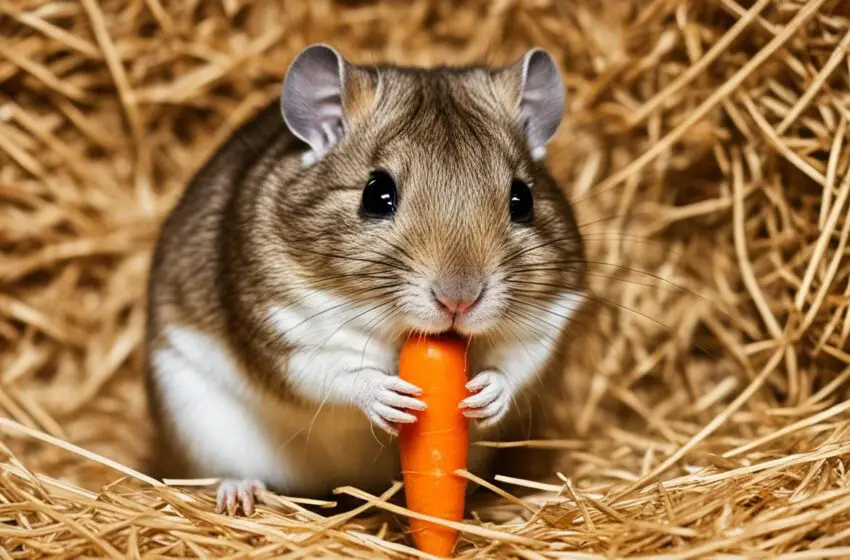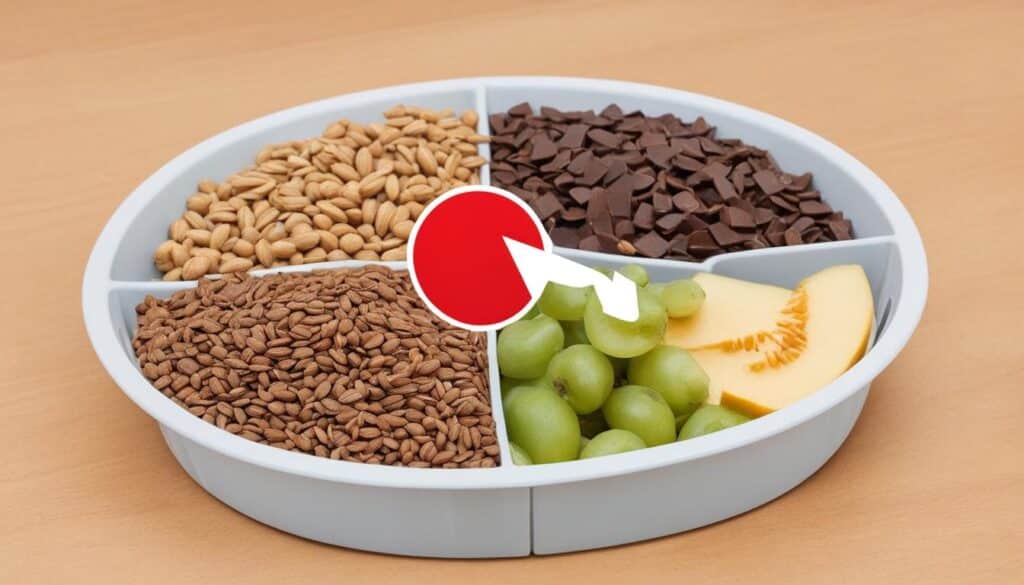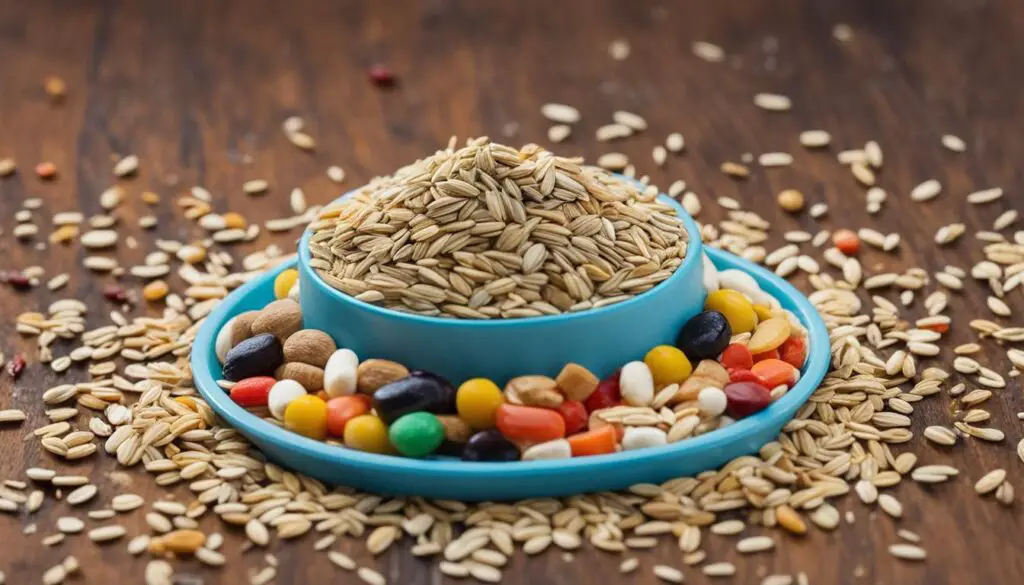Nutrition Management for Pregnant Gerbils

As a gerbil owner, I understand the importance of providing proper nutrition for my pet’s health and well-being. When it comes to pregnant gerbils, nutrition becomes even more crucial. A well-balanced diet not only supports the mother’s overall health but also contributes to the successful development of her offspring. In this article, I will share expert advice on nutrition management for pregnant gerbils, ensuring that you can provide the best care for your furry friends during this special time.
Key Takeaways:
- Proper nutrition is essential for pregnant gerbils to maintain their health and support their offspring’s development.
- A well-balanced diet includes commercial gerbil food, fresh vegetables, and occasional treats.
- Avoid feeding pregnant gerbils chocolate, caffeine, sugary treats, and high-fat foods, as these can be harmful.
- Ensure that pregnant gerbils have access to fresh, clean water at all times to stay hydrated.
- Consult with a veterinarian before adding any supplements to the gerbils’ diet to meet their increased nutritional needs.
Importance of Proper Nutrition for Pregnant Gerbils
Providing proper nutrition for pregnant gerbils is crucial for their overall health and the development of their offspring. A well-balanced diet ensures that the gerbils receive all the necessary nutrients to support a healthy pregnancy and successful breeding.
Pregnant gerbils have increased nutritional needs due to the demands of pregnancy and the growth of their offspring. It is essential to provide them with a diet that meets these requirements to ensure optimal health and well-being.
Adequate nutrition during pregnancy promotes the following benefits:
- Optimal growth and development of the fetus
- Reduced risk of birth defects
- Enhanced immune system of both the mother and the offspring
- Increased chances of successful delivery
- Improved milk production for nursing
Proper nutrition for pregnant gerbils should include a combination of high-quality commercial gerbil food, fresh vegetables, and occasional treats. It is essential to provide a diverse range of food options to ensure that the gerbils receive all the necessary nutrients.
It is recommended to consult with a veterinarian or an expert in gerbil nutrition to determine the specific dietary needs of pregnant gerbils. They can provide guidance on the appropriate portion sizes and the types of food that should be included in their diet.
Pregnant gerbils must receive proper nutrition to support the health of both the mother and her offspring. Neglecting their dietary needs can lead to complications during pregnancy and affect the overall well-being of the gerbils.
In addition to nutrition, adequate hydration is also essential for pregnant gerbils. Fresh, clean water should be readily available to them at all times.
Nutritional Requirements for Pregnant Gerbils
Pregnant gerbils have specific nutritional requirements that must be met to ensure a healthy pregnancy and the proper development of their offspring. It is crucial to provide a well-balanced diet that is rich in protein, fiber, vitamins, and minerals. These essential nutrients contribute to the overall health and vitality of the pregnant gerbil and support the growth and development of healthy offspring.
Protein is particularly important during pregnancy as it plays a vital role in tissue growth and repair. Good sources of protein for pregnant gerbils include high-quality commercial gerbil food, fresh vegetables, and occasional lean meats or eggs. This helps ensure that the gerbils receive the necessary amino acids for proper development.
Fiber is essential for maintaining healthy digestion in pregnant gerbils. Including fiber-rich foods such as hay, fresh greens, and vegetables aids in preventing constipation and promotes optimal gut health. It is important to introduce these foods gradually to allow the gerbils’ digestive systems to adjust.
Vitamins and minerals are vital for the overall well-being of pregnant gerbils and their offspring. A diet rich in fruits and vegetables such as carrots, broccoli, and leafy greens provides essential vitamins, including vitamin A, C, and E. These vitamins contribute to the gerbils’ immune health and support their developing young.
Minerals, such as calcium and phosphorus, are crucial for bone development in both the pregnant gerbil and her offspring. Including calcium-rich foods like kale, sesame seeds, and low-fat dairy products helps ensure adequate mineral intake. However, it is important to avoid excessive supplementation, as high levels of certain minerals can be detrimental to the gerbils’ health.
To ensure the nutritional requirements of pregnant gerbils are met, it is recommended to consult with a veterinarian experienced in exotic pet care. They can provide specific guidance on the ideal diet and feeding practices based on the gerbils’ individual needs and circumstances.
“During pregnancy, providing proper nutrition to gerbils is crucial for their health and the development of their offspring. A well-balanced diet rich in protein, fiber, vitamins, and minerals ensures a successful and healthy pregnancy.”
| Nutrients | Sources |
|---|---|
| Protein | High-quality gerbil food, fresh vegetables, lean meats, eggs |
| Fiber | Hay, fresh greens, vegetables |
| Vitamins | Fruits, vegetables (carrots, broccoli, leafy greens) |
| Minerals | Kale, sesame seeds, low-fat dairy products |
Next, let’s explore the recommended diet for pregnant gerbils and the importance of including specific food groups for their well-being and the well-being of their offspring.
Recommended Diet for Pregnant Gerbils
During pregnancy, gerbils have increased nutritional needs to support their own health and the development of their offspring. Providing a recommended diet is crucial to ensure that pregnant gerbils receive all the necessary nutrients. A balanced diet should consist of a combination of commercial gerbil food, fresh vegetables, and occasional treats.
Commercial Gerbil Food: Choose a high-quality commercial gerbil food that is specifically formulated for pregnant gerbils. These foods are designed to provide a balanced combination of proteins, fibers, vitamins, and minerals necessary for the gerbils’ well-being.
Fresh Vegetables: Incorporate a variety of fresh vegetables into the gerbils’ diet. Vegetables such as carrots, broccoli, spinach, and kale are rich in essential nutrients and can be beneficial for the health of both the mother gerbil and her babies. Remember to wash the vegetables thoroughly before feeding them to your gerbils.
Occasional Treats: While it is important to provide a healthy diet, occasional treats can be given as a source of enrichment and variety. Treats like small pieces of fruits, such as apples or berries, or a small amount of unsalted nuts can be offered in moderation. However, it is crucial to avoid overfeeding treats as they can lead to weight gain and digestive issues.
Offering a range of food options will ensure that pregnant gerbils receive all the necessary nutrients to support their pregnancy and the growth of their offspring. It is vital to monitor the gerbils’ health and adjust the diet as needed in consultation with a veterinarian.
Recommended Diet for Pregnant Gerbils:
| Food | Benefits |
|---|---|
| Commercial gerbil food | Provides balanced nutrition |
| Fresh vegetables | Rich in essential nutrients |
| Occasional treats | Enrichment and variety |
Foods to Avoid During Pregnancy
During pregnancy, it is important to be mindful of the foods you feed your pregnant gerbils to ensure their well-being and the health of their offspring. Certain foods can pose complications and potential harm, so it’s crucial to avoid them. Here are some foods that should be avoided:
- Chocolate: While chocolate may be a delicious treat for humans, it can be toxic to gerbils. The theobromine and caffeine content in chocolate can cause adverse effects on their cardiovascular and nervous systems.
- Caffeine: Just like humans, gerbils should avoid caffeine. It can cause increased heart rate, restlessness, and other health issues.
- Sugary treats: Excessive sugar intake can lead to weight gain, dental problems, and other health complications for pregnant gerbils.
- High-fat foods: Avoid feeding your pregnant gerbil high-fat foods, as they can lead to obesity and related health issues.
By steering clear of these foods, you can minimize the risks and promote a healthier pregnancy for your gerbils. Remember to consult with a veterinarian for a comprehensive list of foods to avoid during pregnancy.

Hydration and Water Requirements for Pregnant Gerbils
Proper hydration is crucial for the health and well-being of pregnant gerbils. Adequate water intake supports their overall hydration levels and helps promote healthy digestion. To ensure your pregnant gerbils stay properly hydrated, it is important to provide them with constant access to fresh, clean water.
Gerbils have a high metabolic rate, which means they require more water compared to some other small mammals. Pregnant gerbils, in particular, have increased water needs to support their own bodily functions as well as the development of their growing litter. Dehydration can lead to various health issues and may negatively impact the pregnancy, so it’s essential to pay close attention to their water requirements.
Here are some key points to remember regarding hydration and water requirements for pregnant gerbils:
- Always ensure that fresh water is readily available to your pregnant gerbils. Provide a water bottle or a shallow dish that is easily accessible for them.
- Regularly check the water source to ensure it is clean and free from any contaminants. Gerbils are susceptible to bacterial infections, so maintaining a clean water supply is crucial.
- Monitor the water intake of your pregnant gerbils. They should be drinking consistently throughout the day. If you notice a sudden decrease in water consumption, it could be a sign of an underlying health issue, and you should consult a veterinarian.
- Consider using a water bottle instead of a dish to prevent bedding or other materials from contaminating the water. This helps ensure that the water remains clean and safe for your gerbils to drink.
By prioritizing hydration and providing your pregnant gerbils with ample access to clean water, you are supporting their overall health and well-being. Remember to regularly check their water supply and keep an eye out for any changes in their water intake, as it can be an important indicator of their health status.
“Proper hydration is essential for pregnant gerbils. They should always have access to fresh, clean water to stay hydrated and promote healthy digestion.”
For a visual representation of proper hydration and water requirements for pregnant gerbils, refer to the table below:
| Hydration Guidelines for Pregnant Gerbils | Water Requirements |
|---|---|
| Always provide fresh, clean water | Free access throughout the day |
| Regularly check water source | Ensure it is clean and free from contaminants |
| Monitor water intake | Look for consistent and adequate consumption |
| Consider using a water bottle | Prevents contamination and keeps water clean |
Ensuring proper hydration is just as crucial as providing a well-balanced diet for the health and well-being of pregnant gerbils. By keeping their water supply clean and accessible, you are contributing to their overall comfort and enabling them to thrive during their pregnancy.
Supplements for Pregnant Gerbils
In some cases, pregnant gerbils may require supplements to meet their increased nutritional needs. These supplements can provide essential nutrients such as calcium, vitamin D, and omega-3 fatty acids that contribute to a healthy pregnancy and the development of their offspring.
Consulting with a veterinarian is crucial before introducing any supplements to the gerbils’ diet. A professional can assess the individual needs of the gerbils and recommend the appropriate type and dosage of supplements.
Calcium is an important mineral for pregnant gerbils as it supports the growth of strong bones and teeth in both the mother and her offspring. Vitamin D aids in the absorption of calcium and helps regulate various bodily functions.
Omega-3 fatty acids, such as those found in fish oil, are beneficial for the overall health of pregnant gerbils. These fatty acids contribute to brain development and have anti-inflammatory properties that support a healthy immune system.
When providing supplements to pregnant gerbils, it is essential to follow the veterinarian’s instructions carefully. Improper administration or excessive supplementation can lead to health issues. Always monitor the gerbils closely for any signs of adverse reactions or changes in behavior.
Remember, supplements should not replace a well-balanced diet. They are meant to complement the gerbils’ nutrition and ensure they receive all the necessary nutrients for a successful pregnancy and the healthy growth of their offspring.

| Supplement | Benefits |
|---|---|
| Calcium | – Supports bone and teeth development – Essential for muscle function |
| Vitamin D | – Aids in calcium absorption – Supports overall bodily functions |
| Omega-3 Fatty Acids | – Supports brain development – Promotes a healthy immune system |
Conclusion
Proper nutrition is of utmost importance for the health and well-being of pregnant gerbils and their offspring. By providing a balanced diet that meets their nutritional requirements, gerbil owners can contribute to a successful and healthy pregnancy.
A well-balanced diet rich in protein, fiber, vitamins, and minerals is essential for pregnant gerbils. This ensures that they receive the necessary nutrients for their own health and the proper development of their offspring.
In addition to proper nutrition, it is crucial to avoid certain foods that could be harmful during pregnancy. Foods such as chocolate, caffeine, sugary treats, and high-fat foods should be eliminated from the gerbils’ diet to prevent complications and promote a smooth pregnancy.
Furthermore, maintaining proper hydration is vital for pregnant gerbils. Access to fresh, clean water at all times helps them stay hydrated and supports healthy digestion.
It is recommended to consult with a veterinarian to ensure that the specific nutritional needs of pregnant gerbils are met. A veterinarian can provide expert advice and guidance on the best diet and any necessary supplements for the well-being of the pregnant gerbil and her offspring.
By prioritizing nutrition, gerbil owners can contribute to the overall health and well-being of their furry friends, ensuring a successful and thriving pregnancy.
FAQ
What should pregnant gerbils eat?
Pregnant gerbils should eat a well-balanced diet consisting of commercial gerbil food, fresh vegetables, and occasional treats.
Are there any foods that pregnant gerbils should avoid?
Yes, pregnant gerbils should avoid chocolate, caffeine, sugary treats, and high-fat foods during pregnancy.
How important is proper hydration for pregnant gerbils?
Proper hydration is essential for pregnant gerbils. They should always have access to fresh, clean water to stay hydrated and promote healthy digestion.
Should pregnant gerbils be given any supplements?
In some cases, supplements may be recommended for pregnant gerbils to meet their increased nutritional needs. Consultation with a veterinarian is important before adding any supplements to their diet.
What role does nutrition play in the health of pregnant gerbils and their offspring?
Proper nutrition is crucial for the health and well-being of pregnant gerbils and the development of their offspring. It contributes to a successful and healthy pregnancy.



